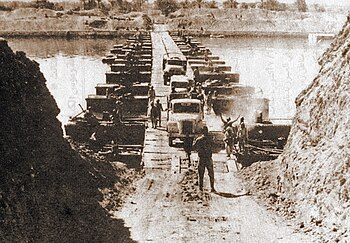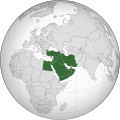욤키푸르 전쟁
욤키푸르 전쟁, 라마단 전쟁, 10월 전쟁(히브리어: מלחמת יום הכיפורים, Milẖemet Yom HaKipurim, or מלחמת יום כיפור, Milẖemet Yom Kipur; 아랍어: حرب أكتوبر, Ḥarb ʾUktōbar, or 아랍어: حرب تشرين, Ḥarb Tišrīn), 또는 1973년 아랍-이스라엘 전쟁은 1973년 10월 6일부터 10월 25일까지 이집트와 시리아가 주축이 된 아랍 연합군과 이스라엘이 치른 전쟁이다. 전투는 대부분 1967년 6일 전쟁 이후 이스라엘이 점령한 시나이반도와 골란고원을 중심으로 벌어졌다. 이집트의 대통령 안와르 사다트는 수에즈 운하도 다시 이집트의 통제권에 두기를 원했다. 이스라엘 지도자들은 확신하지 못했지만, 아랍군은 이스라엘을 완전히 격멸하려고 계획하지는 않았다.[47][48]
전쟁은 1973년 아랍 연합군이 이스라엘 점령지에 기습적인 합동공격을 개시하면서 시작되었다. 이 때는 이스라엘의 휴일인 욤 키푸르이자 이슬람의 신성한 기간인 라마단이 동시에 있었던 달이었다.[49] 이집트와 시리아는 휴전선을 넘어 각각 시나이반도와 골란고원을 향해 진격했다. 미국과 소련은 전쟁 기간 동안 그들의 동맹국에 대량으로 물자를 보급했고, 이로 인해 이 전쟁은 두 핵보유 강대국의 대결 수준에 이르렀다.[50]
이집트의 바드르 작전이 성공적으로 개시되면서 전투가 시작되었다. 이집트군은 휴전선을 건너 시나이반도를 향해 거의 저항을 받지 않고 진격했다. 3일 후 이스라엘은 병력 대부분을 동원해 이집트군의 공세를 정지시킴으로써 교착이 이루어지게 되었다. 시리아군은 이집트의 공세에 발맞추어 골란고원을 향해 공격을 시작했고, 초기에 이스라엘 점령지를 위협하는 데 성공했다. 그러나 3일 후 이스라엘군은 시리아군을 휴전선 지역까지 몰아냈다.
이스라엘 방위군은 4일 간 시리아 종심부를 향해 반격을 가했다. 이스라엘 포병이 다마스쿠스 외곽에 포격을 가하기 시작했고, 이집트 대통령 안와르 사다트는 그의 주요 동맹과의 통합을 우려했다. 그는 시나이반도에 위치한 2개의 전략적 고지를 점령하면 전후 협상에서 그의 위치가 강화될 것이라 여겼고, 이에 따라 이집트군에게 공세를 지속하라고 지시했다. 하지만 이스라엘군은 이집트군의 공세를 저지했다. 이스라엘군은 다시 반격을 개시해 수에즈 운하에 주둔한 이집트군을 격퇴시켰고, 수에즈와 이스마일리아에서 격전을 벌였다.1주 간의 격전으로 인해[51][52] 양측은 모두 큰 피해를 입었다.
10월 22일, 유엔의 중재안이 발표되었고, 양측은 서로 중재안을 위반했다고 비난했다. 10월 24일, 이스라엘군은 거점을 강화해 이집트 제3군과 수에즈를 포위하는 데 성공했다. 이로 인해 미국과 소련 사이에 긴장이 높아지게 되었고, 제2차 휴전안이 10월 25일 발표되어 욤키푸르 전쟁은 종결되었다.
같이 보기
[편집]각주
[편집]내용주
[편집]- ↑ 소련 군사고문단에 투입된 전문가 수는 부여된 과제와 여러 군사적·정치적 요인에 따라 달라졌다.
참조주
[편집]- ↑ “An unknown story from the Yom Kippur war: Israeli F-4s vs North Korean MiG-21s”. 《The Aviationist》. 2013년 6월 24일. 2015년 6월 27일에 확인함.
- ↑ David Rodman, "Friendly Enemies: Israel and Jordan in the 1973 Yom Kuppur War", The Israel Journal of Foreign Affairs, Vol. 6 No. 1 (January 2012), pp. 95–96.
- ↑ 가 나 Perez, Cuba, Between Reform and Revolution, pp. 377–379. Gott, Cuba, A New History, p. 280.
- ↑ Edgar O'Ballance. 《No Victor, No Vanquished: The Yom Kippur War》 1979판. Barrie & Jenkins Publishing. 28–370쪽. ISBN 978-* 0214206702
|isbn=값 확인 필요: invalid character (도움말). - ↑ Mahjoub Tobji (2006). 《Les officiers de Sa Majesté: Les dérives des généraux marocains 1956–2006》. 107: Fayard. ISBN 978-2213630151.
- ↑ Shazly, p. 278.
- ↑ Hussain, Hamid (November 2002). “Opinion: The Fourth round — A Critical Review of 1973 Arab–Israeli War”. 《Defence Journal》. 2009년 1월 16일에 원본 문서에서 보존된 문서.
- ↑ List of Arab contributions by country; Kuwait Defense Minister, His Highness Sheikh Saad Al-Salim Al-Sabah visiting Egyptian front in 1972 and issues war operation order 3967 to enact Al-Jahra Force
- ↑ Kuwaiti Ministry of Defense 보관됨 10월 24, 2012 - 웨이백 머신
- ↑ Smith, Terence (1973년 10월 18일). “Hundreds of Tanks Clash in a Struggle for Suez Area”. 《The New York Times》.
North Korea has decided to give military assistance to Egypt and Syria, its press agency [...] said today.
- ↑ Bidanda M. Chengappa (2004년 1월 1일). 《Pakistan: Islamisation Army And Foreign Policy》. APH Publishing. 42쪽. ISBN 978-81-7648-548-7. 2013년 2월 22일에 확인함.
- ↑ Simon Dunstan (2003년 4월 20일). 《The Yom Kippur War 1973 (2): The Sinai》. Osprey Publishing. 39쪽. ISBN 978-1-84176-221-0. 2013년 2월 22일에 확인함.
- ↑ P. R. Kumaraswamy (2013년 1월 11일). 《Revisiting the Yom Kippur War》. Routledge. 75쪽. ISBN 978-1-136-32895-4. 2013년 2월 22일에 확인함.
- ↑ Ra’anan, G. D. (1981). The Evolution of the Soviet Use of Surrogates in Military Relations with the Third World, with Particular Emphasis on Cuban Participation in Africa. Santa Monica: Rand Corporation. p. 37
- ↑ Fisher, Marc (1993년 2월 28일). “E. Germany Ran Antisemitic Campaign in West in '60s”. 《Washington Post》.
- ↑ Kienle, Eberhard (1995). “Arab Unity Schemes Revisited: Interest, Identity, and Policy in Syria and Egypt”. 《International Journal of Middle East Studies》 27 (1): 53–71. doi:10.1017/S0020743800061584. ISSN 0020-7438. JSTOR 176187. S2CID 154588444.
- ↑ “The Yom Kippur War”. Jewishvirtuallibrary.org. 1973년 10월 6일. 2011년 10월 22일에 확인함.
- ↑ Rabinovich, I. The War for Lebanon, 1970–1985. p.105. "Lebanon was perceived as Israel's one harmless neighbour, a state that since 1949 had not taken part in the Arab–Israeli wars …"
- ↑ Loyola, Mario (2013년 10월 7일). “How We Used to Do It – American diplomacy in the”. 《National Review》. 1면. 2013년 12월 2일에 확인함.
- ↑ 가 나 Morris, 2011, Righteous Victims, p. 437
- ↑ Morris, 2011 p.433, "Bashan ... 500 square kilometers ... which brought it within 20 miles of Damascus"
- ↑ Kumaraswamy, P. R. (2013년 1월 11일). 《Revisiting the Yom Kippur War》 (영어). Routledge. 235쪽. ISBN 9781136328954.
- ↑ 가 나 다 라 Rabinovich. 《The Yom Kippur War》. 54쪽.
- ↑ Insight Team of the London Sunday Times, p. 372–373.
- ↑ 가 나 다 The number reflects artillery units of caliber 100 mm and up
- ↑ Herzog. 239쪽.
|제목=이(가) 없거나 비었음 (도움말) - ↑ Shazly, p. 244.
- ↑ Shazly, p. 272.
- ↑ Haber & Schiff, pp. 30–31.
- ↑ USMC Major Michael C. Jordan (1997). “The 1973 Arab–Israeli War: Arab Policies, Strategies, and Campaigns”. GlobalSecurity.org. 2009년 4월 20일에 확인함.
- ↑ Major George E. Knapp (1992). 〈4: Antiarmor Operations on the Golan Heights〉. 《Combined Arms in battle since 1939》. U.S. Army Command and General Staff College. 2010년 5월 7일에 원본 문서에서 보존된 문서. 2009년 6월 1일에 확인함.
- ↑ Rabinovich, pp. 464–465.
- ↑ Bourne, Peter G. (1986). Fidel: A Biography of Fidel Castro. New York: Dodd, Mead & Company.[쪽 번호 필요]
- ↑ 가 나 다 “Le jour où Hassan II a bombardé Israël”. 《Le Temps》. October 14, 2013에 원본 문서에서 보존된 문서. 25 December 2013에 확인함.
- ↑ Rabinovich, p. 314.
- ↑ Bar-On, Mordechai (2004). 《A Never Ending Conflict》. Greenwood Publishing. 170쪽.
- ↑ Schiff, A History of the Israeli Army, p. 328.
- ↑ 가 나 다 라 Garwych, p. 243.
- ↑ Journal "الأهرام","Al Ahram". 14 October 1974
- ↑ Rabinovich. 《The Yom Kippur War》. 497쪽.
- ↑ Rabinovich, p. 496
- ↑ “White House Military Briefing” (PDF). 2011년 10월 22일에 확인함.
- ↑ "القوة الثالثة، تاريخ القوات الجوية المصرية." Third Power: History of Egyptian Air Force Ali Mohammed Labib. pp. 187
- ↑ 가 나 Herzog, Encyclopaedia Judaica, Keter Publishing House, 1974, p. 87.
- ↑ 가 나 다 라 “Ministry of Foreign Affairs”. Mfa.gov.il. 2011년 10월 22일에 확인함.
- ↑ 가 나 Dunstan, p. 200.
- ↑ Denis Joseph Sullivan; Kimberly Jones (2008). 《Global Security Watch—Egypt: A Reference Handbook》. ABC-CLIO. 9–쪽. ISBN 978-0-275-99482-2.
Sadat's goals were the` return of Sinai and the reopening of the Suez Canal ... to reengage the U.S in middle east diplomacy
- ↑ Benny Morris (2011년 5월 25일). 《Righteous Victims: A History of the Zionist-Arab Conflict, 1881–1998》. Knopf Doubleday Publishing Group. 396쪽. ISBN 978-0-307-78805-4.
Sadat and Assad 'sought to regain the territories lost in 1967. Neither aimed to destroy Israel, though during the opening hours of the conflict, its leaders could not be sure of it.'
- ↑ El-Gamasy (1993). 《The October War: Memoirs of Field Marshal El-Gamasy of Egypt》. The American University in Cairo Press. 181쪽.
- ↑ Quandt, William (2005). 《Peace Process: American Diplomacy and the Arab–Israeli Conflict Since 1967》 Thi판. USA: University of California Press. 104–105쪽. ISBN 9780520246317. 2017년 1월 14일에 확인함.
- ↑ Hammad (2002), pp.237–276
- ↑ Gawrych (1996), p.60
참고자료
[편집]- In Search of Identity: An Autobiography by Anwar Sadat.
- Man of Defiance: A Political Biography of Anwar Sadat by Raphael Israeli.
- Syria and Israel: From War to Peacemaking by Moshe Maòz.
- The Yom Kippur War: The Epic Encounter That Transformed the Middle East by Abraham Rabinovich. ISBN 0-8052-4176-0
- Why Economic Sanctions Do Not Work by Robert A. Pape
- The Road to Ramadan by Mohamed Heikal.
- Inside the Kremlin During the Yom Kippur War by Victor Israelyan, 1995 ISBN 0-271-01489-X, ISBN 0-271-01737-6
- 배틀 전쟁의 문화사. 존린 저 이내주 박일송 옮김
- 골란고원의 영웅들 A. 카할리니. 임채상 편역
외부 링크
[편집]- [1]
- Maps: Egypt 보관됨 2007-11-19 - archive.today
- Maps: Syria 보관됨 2007-11-19 - archive.today
- The October War, Al Ahram supplement
- The October War and US Policy — Provided by the National Security Archive.
- Lessons of the October War, Ahmad Faruqui Archived 2006년 8월 15일 - 웨이백 머신
- A Cry From The Bunkers Archived 2019년 3월 12일 - 웨이백 머신 — Dramatic and authentic recordings by IDF soldier Avi Yaffe from inside the IDF position, under attack at the outbreak of the war.
- The reasons of the war. — Provided by Major Ebrahim Al-Jowder Bahrain Armed Forces.
- The 1973 October War: The Egyptian Perspective — Provided By Major J.C. Moulton, United States Air Force.
- The 1973 Arab-Israeli War: Arab Policies, Strategies, and Campaigns— Provided by Major Michael C. Jordan, United States Marine Corps.
- Operation Valiant: Turning of the Tide in the Sinai 1973 Arab-Israeli War - by Major Richard L. Owen, US Marine Corps Command and Staff College.
- Yom Kippur War: Sacrificial Stand in the Golan Heights - by Gary Rashba, Military History Magainze, October 1998 issue.


